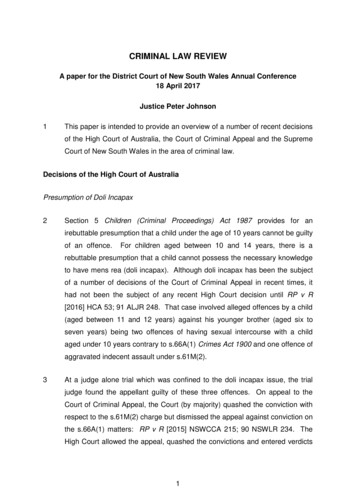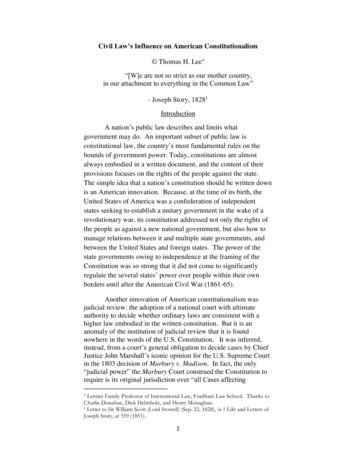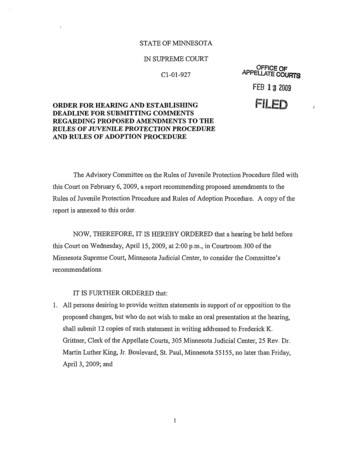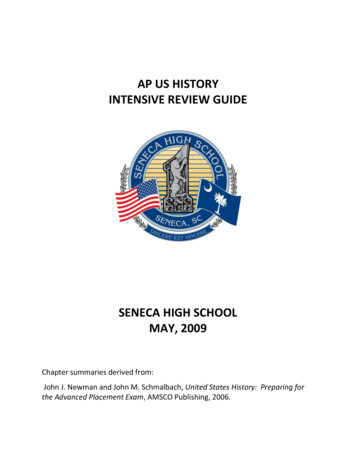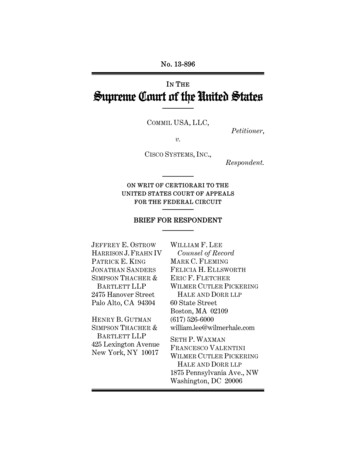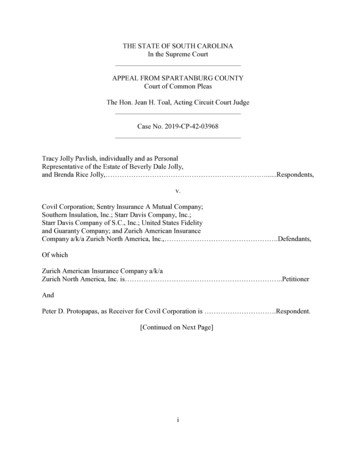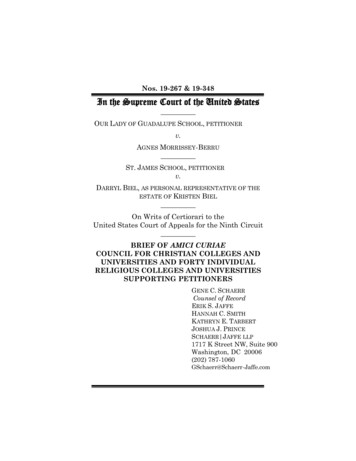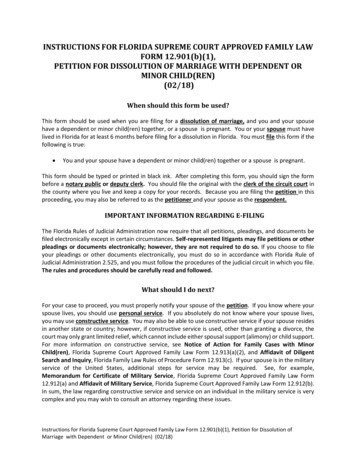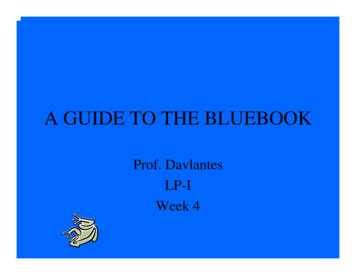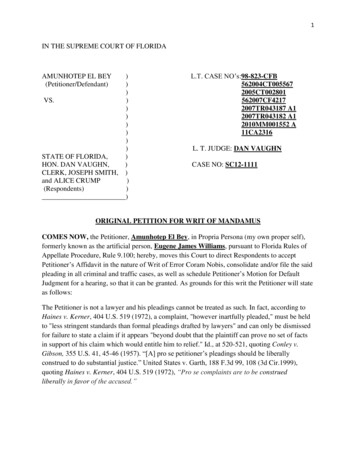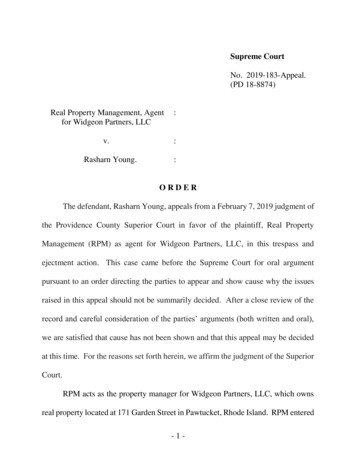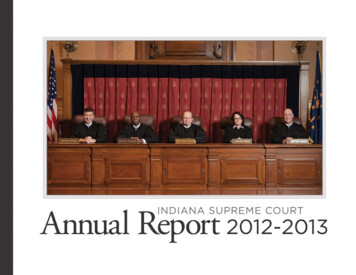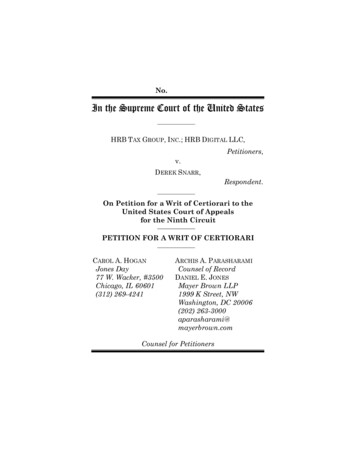
Transcription
No.In the Supreme Court of the United StatesHRB TAX GROUP, INC.; HRB DIGITAL LLC,Petitioners,v.DEREK SNARR,Respondent.On Petition for a Writ of Certiorari to theUnited States Court of Appealsfor the Ninth CircuitPETITION FOR A WRIT OF CERTIORARICAROL A. HOGANJones Day77 W. Wacker, #3500Chicago, IL 60601(312) 269-4241ARCHIS A. PARASHARAMICounsel of RecordDANIEL E. JONESMayer Brown LLP1999 K Street, NWWashington, DC 20006(202) 263-3000aparasharami@mayerbrown.comCounsel for Petitioners
iQUESTION PRESENTEDThis Court has repeatedly held that the FederalArbitration Act “protect[s]” agreements “to use individualized rather than class or collective action procedures,” and that “courts may not allow a contract defense to reshape traditional individualized arbitration.” Epic Sys. Corp. v. Lewis, 138 S. Ct. 1612, 1621,1623 (2018).But the California Supreme Court has interpretedCalifornia’s consumer-protection laws to authorize“public injunctive relief”—which it defines as reliefthat “prevent[s] further harm to the public at large”and not “[r]elief that has the primary purpose or effectof redressing or preventing injury to an individualplaintiff.” McGill v. Citibank, N.A., 393 P.3d 85, 90(Cal. 2017) (quotation marks omitted). And that courthas held that “a provision in a predispute arbitrationagreement that waives the right to seek this statutoryremedy * * * is contrary to California public policy andis thus unenforceable under California law.” Id. at 87.The question presented is whether California’spublic-policy rule declining to enforce agreements forindividualized arbitration whenever a plaintiff seeksa public injunction is preempted by the FAA.
iiPARTIES TO THE PROCEEDING BELOWPetitioners HRB Tax Group, Inc. and HRB DigitalLLC were defendants-appellants below. RespondentDerek Snarr was plaintiff-appellee below. PelanatitaOlosoni had been a plaintiff-appellee below, but herclaims were voluntarily dismissed in the district courtduring the pendency of the appeal. H&R Block, Inc.had been a defendant in the district court, but the operative amended complaint dropped the claimsagainst it.RULE 29.6 STATEMENTHRB Tax Group, Inc. and HRB Digital LLC eachis a wholly owned indirect subsidiary of H&R Block,Inc., a publicly traded company with no parent corporation. BlackRock, Inc., through its subsidiaries, isthe beneficial owner of more than 10% of the commonstock of H&R Block, Inc.
iiiRULE 14.1(b)(iii) STATEMENTThe following proceedings are directly related tothis case: Snarr v. HRB Tax Group et al., No. 3:19-cv03610-SK (N.D. Cal.). Snarr v. HRB Tax Group et al., No. 19-17441(9th Cir.) (judgment entered December 9,2020).
ivTABLE OF CONTENTSPageQUESTION PRESENTED.iPARTIES TO THE PROCEEDING BELOW . iiRULE 29.6 STATEMENT . iiRULE 14.1(b)(iii) STATEMENT . iiiTABLE OF AUTHORITIES. viOPINIONS BELOW . 1JURISDICTION . 1CONSTITUTIONAL AND STATUTORY PROVISIONS INVOLVED . 1STATEMENT . 2A. “Public” Injunctions Under CaliforniaLaw. 6B. The McGill and Blair Decisions. 7C. Respondent’s Arbitration Agreement . 8D. Proceedings Below . 9REASONS FOR GRANTING THE PETITION . 11A. California’s McGill Rule Is PreemptedBy The FAA, And The Ninth Circuit’sContrary Conclusion Defies ThisCourt’s Precedents . 131. Public-injunction requests are fundamentally inconsistent with arbitration’s traditionally individualized and informal nature. . 162. The Ninth Circuit’s reasons for rejecting preemption cannot besquared with this Court’s precedents. . 20
vTABLE OF CONTENTS(continued)PageB. The Issue Presented Is Extremely Important And Impacts Countless Arbitration Agreements . 22CONCLUSION . 28Appendix A: Opinion of the Ninth Circuit(Dec. 9, 2020). 1aAppendix B: District Court Order(Nov. 5, 2019). 7aAppendix C: Arbitration Agreement . 24aAppendix D: Relevant Post-McGillComplaints . 29a
viTABLE OF AUTHORITIESPage(s)CasesAllied-Bruce Terminix Cos. v. Dobson,513 U.S. 265 (1995) . 25AT&T Mobility LLC v. Concepcion,563 U.S. 333 (2011) . passimBlair v. Rent-A-Center, Inc.,928 F.3d 819 (9th Cir. 2019) . passimBroughton v. Cigna Healthplans,988 P.2d 67 (Cal. 1999) . 6, 7Cisneros v. U.D. Registry, Inc.,46 Cal. Rptr. 2d 233 (Ct. App. 1995) . 18Colgan v. Leatherman Tool Grp., Inc.,38 Cal. Rptr. 3d 36 (Ct. App. 2006) . 17Cottrell v. AT&T Inc.,2020 WL 2747774 (N.D. Cal. May 27,2020) . 23Cruz v. PacifiCare Health Sys., Inc.,66 P.3d 1157 (Cal. 2003) . 6Delisle v. Speedy Cash,2020 WL 6817702 (S.D. Cal. Nov. 20,2020) . 23DiCarlo v. MoneyLion, Inc.,988 F.3d 1148 (9th Cir. 2021) . 7DIRECTV, Inc. v. Imburgia,577 U.S. 47 (2015) . 15, 26EEOC v. Waffle House, Inc.,534 U.S. 279 (2002) . 13
viiTABLE OF AUTHORITIES—continuedPage(s)Eiess v. USAA Fed. Savings Bank,404 F. Supp. 3d 1240 (N.D. Cal. Aug.23, 2019) . 23Epic Sys. Corp. v. Lewis,138 S. Ct. 1612 (2018) . passimFerguson v. Corinthian Colleges,733 F.3d 928 (9th Cir. 2013) . 6Fernandez v. Bridgecrest Credit Co.,2019 WL 7842449 (C.D. Cal. Oct. 29,2019) . 23Kindred Nursing Ctrs. Ltd. P’ship v.Clark,137 S. Ct. 1421 (2017) . 21Lamps Plus Inc. v. Varela,139 S. Ct. 1407 (2019) . 14, 15, 26Laster v. T-Mobile USA, Inc.,2008 WL 5216255 (S.D. Cal. Aug. 11,2008) . 10Lotsoff v. Wells Fargo Bank, N.A.,2019 WL 4747667 (S.D. Cal. Sept.30, 2019) . 23Lyons v. NBCUniversal Media, LLC,2019 WL 6703396 (C.D. Cal. Sept.27, 2019) . 23Maldonado v. Fast Auto Loans, Inc.,275 Cal. Rptr. 3d 82 (Ct. App. 2021) . 16, 23
viiiTABLE OF AUTHORITIES—continuedPage(s)McArdle v. AT&T Mobility LLC,772 F. App’x 575 (9th Cir. 2019). 8McGill v. Citibank, N.A.,393 P.3d 85 (Cal. 2017) . passimMcGovern v. U.S. Bank, N.A.,362 F. Supp. 3d 850 (S.D. Cal. 2019) . 24McGovern v. U.S. Bank N.A.,2020 WL 4582687 (S.D. Cal. Aug. 10,2020) . 25Mejia v. DACM Inc.,268 Cal. Rptr. 3d 642 (Ct. App. 2020) . 22Nguyen v. Tesla, Inc.,2020 WL 2114937 (C.D. Cal. Apr. 6,2020) . 23Perry v. Thomas,482 U.S. 483 (1987) . 26Preston v. Ferrer,552 U.S. 346 (2008) . 26Rivas v. Coverall N. Am., Inc.,842 F. App’x 55 (9th Cir. 2021) . 4, 27Sakkab v. Luxottica Retail N. Am., Inc.,803 F.3d 425 (9th Cir. 2015) . 4Southland Corp. v. Keating,465 U.S. 1 (1984) . 26Stolt-Nielsen S.A. v. Animal Feeds Int’lCorp.,559 U.S. 662 (2010) . 14
ixTABLE OF AUTHORITIES—continuedPage(s)Swanson v. H&R Block, Inc.,475 F. Supp. 3d 967 (W.D. Mo.2020) . passimTillage v. Comcast Corp.,772 F. App’x 569 (9th Cir. 2019). 8Vasquez v. Libre by Nexus, Inc.,2018 WL 5623791 (N.D. Cal. Aug.20, 2018) . 23Wu v. iTalk Global Commc’ns,2020 WL 8461696 (C.D. Cal. Oct. 21,2020) . 23Yue v. Atlas Res., LLC,2019 WL 6726234 (Cal. Ct. App. Dec.9, 2019) . 17, 18Statutes9 U.S.C. § 2 . 1, 29 U.S.C. § 3 . 129 U.S.C. § 16(b) . 1228 U.S.C. § 1254(1) . 1Cal. Bus. & Prof. Code §§ 17200 et seq. . 6Cal. Bus. & Prof. Code §§ 17500 et seq. . 6Cal. Civ. Code §§ 1750 et seq. . 6
xTABLE OF AUTHORITIES—continuedPage(s)Other AuthoritiesHenry Allen Blair, Class Action WaiversAre Okay, But Waivers Of Public Injunctive Relief Aren’t, ArbitrationNation (July 1, 2019) . 13, 23Alison Frankel, The 9th Circuit JustBlew Up Mandatory Arbitration InConsumer Cases, Reuters (July 1,2019) . 5, 22, 23Lyra Haas, The Endless Battleground:California’s Continued Opposition tothe Supreme Court’s Federal Arbitration Act Jurisprudence, 94 B.U. L.Rev. 1419 (2014) . 26Alan S. Kaplinsky et al., Ninth CircuitHolds FAA Does Not Preempt California’s McGill Rule, The NationalLaw Review (July 2, 2019). 23William L. Stern, RUTTER BUSINESS & PROFESSIONS CODE SECTION 17200PRACTICE (2019) . 17
PETITION FOR A WRIT OF CERTIORARIOPINIONS BELOWThe opinion of the court of appeals (App., infra,1a-6a) is reported at 839 F. App’x 53. The opinion ofthe court of appeals in Blair v. Rent-A-Center, Inc., thecase in which the court of appeals articulated the ruleof decision followed by the court in this case, is reported at 928 F.3d 819. The order of the district courtdenying petitioners’ motion to compel arbitration andto stay litigation (App, infra, 7a-23a) is unreported,but is available at 2019 WL 7576680.JURISDICTIONThe judgment of the court of appeals was enteredon December 9, 2020. App., infra, 1a. This Court’s jurisdiction rests on 28 U.S.C. § 1254(1).CONSTITUTIONAL AND STATUTORYPROVISIONS INVOLVEDThe Supremacy Clause of the Constitution, art.VI, cl. 2, provides in pertinent part:This Constitution, and the Laws of the UnitedStates which shall be made in Pursuancethereof * * * shall be the supreme Law of theLand; and the Judges in every State shall bebound thereby, any Thing in the Constitutionor Laws of any State to the Contrary notwithstanding.Section 2 of the Federal Arbitration Act, 9 U.S.C.§ 2, provides in pertinent part:A written provision in * * * a contract evidencing a transaction involving commerce to settleby arbitration a controversy thereafter arisingout of such contract or transaction, * * * or an
2agreement in writing to submit to arbitrationan existing controversy arising out of suchcontract, transaction, or refusal, shall bevalid, irrevocable, and enforceable, save uponsuch grounds as exist at law or in equity forthe revocation of any contract.STATEMENTThe FAA directs courts to “enforce arbitrationagreements according to their terms—including termsproviding for individualized proceedings.” Epic Sys.Corp. v. Lewis, 138 S. Ct. 1612, 1619 (2018) (emphasisadded). This Court’s long line of precedents interpreting the FAA make clear that the FAA “protect[s]pretty absolutely” agreements calling for “one-on-onearbitration” using “individualized * * * procedures.”Id. at 1619, 1621. This Court has so held on multipleoccasions since its decision a decade ago in AT&T Mobility LLC v. Concepcion, 563 U.S. 333 (2011).Yet once again the Ninth Circuit and the California Supreme Court have sought to evade this Court’sprecedents. The California Supreme Court held that,as a matter of “California public policy,” agreementsfor individualized arbitration may not foreclose individuals from seeking so-called “public injunctions”that are “designed to prevent further harm to the public at large rather than to redress or prevent injury to[the] plaintiff.” McGill v. Citibank, N.A., 393 P.3d 85,86, 89-90 (Cal. 2017) (quotation marks omitted). TheNinth Circuit held that the FAA does not preempt theMcGill rule because California law does not requireclass certification as a prerequisite to public injunctive relief and, in that court’s view, the FAA preemptsonly those state-law rules that impose proceduresequivalent to class arbitration. Blair v. Rent-A-Center,Inc., 928 F.3d 819, 828-31 (9th Cir. 2019); see also
3App., infra, 5a (rejecting petitioners’ preemption arguments as “foreclosed by binding circuit precedent”in Blair).There have been two significant developmentssince Blair that further underscore the need for thisCourt’s review.First, there is now a direct disagreement betweenlower courts over whether McGill is preempted by theFAA. Another judge outside of California faced withthe exact same types of California-law claims againstthe same petitioners, involving the “same arbitrationclause” and “identical facts,” found “divergence [fromBlair] is merited” and held that “McGill is preemptedby the FAA.” Swanson v. H&R Block, Inc., 475 F.Supp. 3d 967, 978 (W.D. Mo. 2020). As that court recognized, a public injunction “has the same practicaleffect as a Rule 23(b)(2) class action.” Id. at 977. Andbecause the McGill rule “mandates reclassification ofavailable relief from one individual to multiple (or inthis case, millions) of people,” it “impermissibly targets one-on-one arbitration” and “interfere[s] with theFAA’s protection of individualized arbitration.” Id. at977-78. Accordingly, the McGill rule could not be distinguished from the California state-law rule heldpreempted in Concepcion. Id. at 976, 978.The conflict between Swanson and the decisionbelow brings to light in this context a phenomenonthat this Court has long understood: When it comes toFAA preemption, the Ninth Circuit marches to thebeat of its own drummer. Put another way, whetherthe FAA, a national statute, requires enforcement ofH&R Block’s standard-form arbitration agreementdepends upon where a plaintiff chooses to file suit.
4This stark conflict is unlikely to deepen for tworeasons. First, when district courts compel arbitration, they typically stay the litigation pending arbitration (as required by Section 3 of the FAA), and suchorders are not directly appealable under Section 16 ofthe FAA. As a result, district court decisions outsidethe Ninth Circuit that declare the McGill rulepreempted are unlikely to reach the courts of appeals.Second, plaintiffs’ counsel will simply file Californialaw claims in California instead, seeking to capitalizeon the Ninth Circuit’s erroneous approach to FAApreemption. As Judge Bumatay recently observed ina related context, “our saving-clause precedent is indisharmony with the Supreme Court’s” and “is in serious need of a course correction.” Rivas v. Coverall N.Am., Inc., 842 F. App’x 55, 58-59 (9th Cir. 2021)(Bumatay, J., concurring). That is because the NinthCircuit’s recent FAA cases “undermine[]” the “parties’choice to engage in individual, bilateral arbitration.”Id. at 59 (discussing Sakkab v. Luxottica Retail N.Am., Inc., 803 F.3d 425 (9th Cir. 2015), on which theBlair court relied heavily in its approach to FAApreemption).Indeed, the Ninth Circuit’s constricted approachto FAA preemption articulated in Blair and followedin this case is irreconcilable with Epic and Concepcion. As in those cases, the McGill rule demands thatarbitration provisions make available a procedure—here, public injunctions—that is inconsistent with the“traditional individualized arbitration” protected bythe FAA. Epic, 138 S. Ct. at 1623. That is because apublic-injunction request focuses on a large group ofthird parties—the “general public”—and not theclaimant; involves much higher stakes; and necessitates more extensive discovery and more complex dispute resolution. And regardless of the particular route
5by which a state-law rule prevents individualized informal arbitration—whether by requiring class procedures (as in Concepcion), or (as here) conditioning theenforcement of arbitration provisions on acquiescenceto a process for adjudicating structural remediesaimed at a large group of third parties—the state-lawrule is preempted.Second, in the last two years, experience hasproven that, as observers had predicted, Blair permitsplaintiffs and their counsel “to evade arbitration in‘virtually every case’ invoking California consumerprotection statutes.” Alison Frankel, The 9th CircuitJust Blew Up Mandatory Arbitration In ConsumerCases, Reuters (July 1, 2019), https://reut.rs/30Ufvxq.Hundreds of plaintiffs have filed lawsuits under California’s consumer statutes since Blair and McGill, expressly seeking a public injunction in a clear effort toavoid their agreements to arbitrate on an individualbasis.Accordingly, the practical consequences of thetwin rulings by the Ninth Circuit and California Supreme Court are enormous. Unless the decision belowis reversed, those arbitration agreements will be heldinvalid with respect to requests for public injunctions.And the result will be that plaintiffs’ lawyers will continue to include at least one such claim in every consumer case in which the parties agreed to arbitratetheir disputes by individual arbitration, thereby undermining the benefits of those agreements and circumventing this Court’s decisions interpreting andapplying the FAA.This Court’s review is therefore essential.
6A. “Public” Injunctions Under CaliforniaLaw.The California Supreme Court has interpretedCalifornia’s consumer-protection statutes to allow aprivate plaintiff to seek “public injunctive relief, i.e.,injunctive relief that has the primary purpose and effect of prohibiting unlawful acts that threaten futureinjury to the general public.” McGill, 393 P.3d at 86(citing California’s Unfair Competition Law (“UCL”),Cal. Bus. & Prof. Code §§ 17200 et seq.; ConsumersLegal Remedies Act (“CLRA”), Cal. Civ. Code §§ 1750et seq.; and False Advertising Law (“FAL”), Cal. Bus.& Prof. Code §§ 17500 et seq.).The “public” injunction was created by the California Supreme Court as a device for circumventing arbitration agreements. In a pair of decisions, thatCourt declared that injunctions sought by consumersunder the UCL, CLRA, and FAL are “inherently incompatible with arbitration” and held that Californiapublic policy prohibited the enforcement of agreements to arbitrate such claims. Broughton v. CignaHealthplans, 988 P.2d 67, 74-78 (Cal. 1999) (CLRA);see Cruz v. PacifiCare Health Sys., Inc., 66 P.3d 1157,1164-65 (Cal. 2003) (UCL and FAL). The Ninth Circuit held that the FAA preempts the Broughton-Cruzrule in Ferguson v. Corinthian Colleges, 733 F.3d 928,934-37 (9th Cir. 2013).More recently, the California Supreme Court hasreconfigured the remedy and its public policy rule.The Court now desc
BlackRock, Inc., through its subsidiaries, is the beneficial owner of more than 10% of the common stock of H&R Block, Inc. iii RULE 14.1(b)(iii) STATEMENT . Corinthian Colleges, 733 F.3d 928 (9th Cir.
